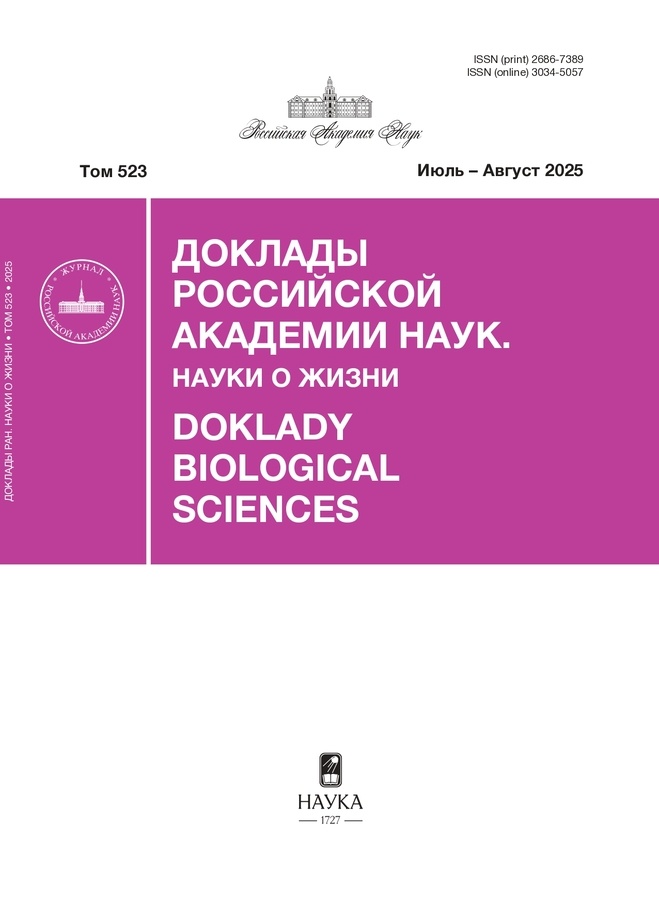Роль запасных липидов при вертикальных миграциях окуня-клювача (Sebastes mentella) Северной Атлантики
- Авторы: Воронин В.П.1, Рольский А.Ю.2, Орлов А.М.3,4, Мурзина С.А.1
-
Учреждения:
- Институт биологии – обособленное подразделение Федерального государственного бюджетного учреждения науки Федерального исследовательского центра “Карельский научный центр Российской академии наук”
- Полярный филиал ФГБНУ “Всероссийский научно-исследовательский институт рыбного хозяйства и океанографии” (“ПИНРО” им. Н.М. Книповича)
- Федеральное государственное бюджетное учреждение науки “Институт океанологии им. П.П. Ширшова Российской академии наук”
- Федеральное государственное бюджетное учреждение науки “Институт проблем экологии и эволюции им. А.Н. Северцова Российской академии наук”
- Выпуск: Том 519, № 1 (2024)
- Страницы: 60-68
- Раздел: Статьи
- URL: https://gynecology.orscience.ru/2686-7389/article/view/651382
- DOI: https://doi.org/10.31857/S2686738924060093
- ID: 651382
Цитировать
Полный текст
Аннотация
Исследовано содержание основных классов запасных липидов – триацилглицеринов, эфиров холестерина и восков – в мышцах и печени окуня-клювача (Sebastes mentella), а также их изменение в градиенте глубин и в разных районах Северной Атлантики. Установлены достоверные различия по количественному содержанию запасных липидов у морских окуней из разных горизонтов лова. Проанализированные изменения липидов в тканях и органах рыб при увеличении глубины свидетельствуют об использовании триацилглицеринов, эфиров холестерина и восков в качестве энергетических источников, в том числе для поддержания плавучести организма при вертикальных перемещениях. Результаты исследования могут быть основой для дальнейшего изучения биохимических механизмов миграций коммерчески ценного промыслового вида морских окуней Северной Атлантики – окуня-клювача, а также других гидробионтов со схожей двигательной активностью.
Полный текст
Об авторах
В. П. Воронин
Институт биологии – обособленное подразделение Федерального государственного бюджетного учреждения науки Федерального исследовательского центра “Карельский научный центр Российской академии наук”
Автор, ответственный за переписку.
Email: voronen-viktor@mail.ru
Россия, Петрозаводск
А. Ю. Рольский
Полярный филиал ФГБНУ “Всероссийский научно-исследовательский институт рыбного хозяйства и океанографии” (“ПИНРО” им. Н.М. Книповича)
Email: voronen-viktor@mail.ru
Россия, Мурманск
А. М. Орлов
Федеральное государственное бюджетное учреждение науки “Институт океанологии им. П.П. Ширшова Российской академии наук”; Федеральное государственное бюджетное учреждение науки “Институт проблем экологии и эволюции им. А.Н. Северцова Российской академии наук”
Email: voronen-viktor@mail.ru
Россия, Москва; Москва
С. А. Мурзина
Институт биологии – обособленное подразделение Федерального государственного бюджетного учреждения науки Федерального исследовательского центра “Карельский научный центр Российской академии наук”
Email: voronen-viktor@mail.ru
Россия, Петрозаводск
Список литературы
- Мантейфель Б.П. Вертикальные миграции морских организмов. Об адаптивном значении вертикальных миграций рыб планктофагов // Труды Института экологии и эволюции животных АН СССР. – 1961. – Т. 39. – С. 5–46.
- Михеев В.Н. Неоднородность среды и трофические отношения у рыб. М.: Наука, 2006. – 191 с
- Hochachka P.W., Somero G.N. Biochemical adaptation: mechanism and process in physiological evolution. N.Y.: Oxford University Press, 2002. – 466 p.
- Сиделева В.Г., Козлова Т.А. Сравнительное изучение эндемичных коттоидных рыб (Cottidae, Comephoridae) в связи с их приспособлением к обитанию в пелагиали озера Байкал // Труды Зоологического Института РАН. – 2010. – Т. 314, № 4. – С. 433–447.
- Lee R.F., Nevenzel J.C., Paffenhofer G.-A. Importance of wax esters and other lipids in the marine food chain: Phytoplankton and copepods // Marine Biology. – 1971. – Vol. 9, N. 2. – P. 99–108.
- Phleger C.F. Biochemical aspects of buoyancy in fishes. Amsterdam: Elsevier, 1991. – P. 209–247.
- Phleger C.F. Buoyancy in marine fishes: Direct and indirect role of lipids // American Zoologist. – 1998. – Vol. 38, N. 2. – P. 321–330.
- Мельников С.П. Океанический окунь-клювач Северной Атлантики: биология и промысел. Мурманск: Издательство ПИНРО, 2006. – 111 с.
- Planque B., Kristinsson K., Astakhov A., et al. Monitoring beaked redfish (Sebastes mentella) in the North Atlantic, current challenges and future prospects// Aquatic Living Resources. – 2013. – Vol. 26, N. 4. – P. 293–306.
- Voronin V.P., Nemova N.N., Ruokolainen T.R., et al. Into the deep: New data on the lipid and fatty acid profile of redfish Sebastes mentella inhabiting different depths in the Irminger sea // Biomolecules. – 2021. – Vol. 11, N. 5. – Article ID. 704.
- Gauthier S. Target Strength of encaged Atlantic redfish (Sebastes spp.) // ICES Journal of Marine Science. – 2001. – Vol. 58, N. 3. – P. 562–568.
- Gauthier S., Rose G.A. An hypothesis on endogenous hydrostasis in Atlantic redfish (Sebastes spp.) // Fisheries Research. – 2002. – Vol. 58, N. 2. – P. 227–230.
- Working group on international deep pelagic ecosystem surveys (WGIDEEPS) // ICES Scientific Reports. – 2021. – Vol. 3:43. – 32 p.
- Folch J., Lees М., Sloane Stanley G.H. A simple method for the isolation and purification of total lipids from animal tissues // Journal of Biological Chemistry. – 1957. – Vol. 226, N. 5. – P. 497–509.
- Olsen R.E., Henderson R.J. The rapid analysis of neutral and polar marine lipids using double-development HPTLC and scanning densitometry // Journal of Experimental Marine Biology and Ecology. – 1989. – Vol. 129, N. 2. – P. 189–197.
- Толстова Ю.Н. Основы многомерного шкалирования: учебное пособие. М.: КДУ, 2006. – 160 с.
- Wood S.N. Low‐Rank scale‐invariant tensor product smooths for generalized additive mixed models // Biometrics. – 2006. – Vol. 62, N. 4. – P. 1025-1036.
- Del Raye G., Jorgensen S.J., Krumhansl K., et al. Travelling light: white sharks (Carcharodon carcharias) rely on body lipid stores to power ocean-basin scale migration // Proceedings of the Royal Society B: Biological Sciences. – 2013. – Vol. 280, N. 1766. – Article ID. 20130836.
- Campbell R., Dower J. Role of lipids in the maintenance of neutral buoyancy by zooplankton // Marine Ecology Progress Series. – 2003. – Vol. 263. – P. 93–99.
- Sargent J.R., Gatten R.R., McIntosh R. Wax esters in the marine environment – their occurrence, formation, transformation and ultimate fates // Marine Chemistry. – 1977. – Vol. 5, N. 4–6. – P. 573–584.
Дополнительные файлы











